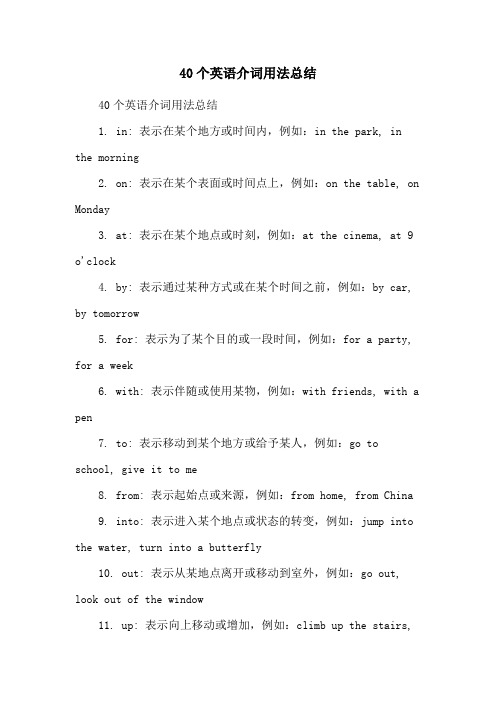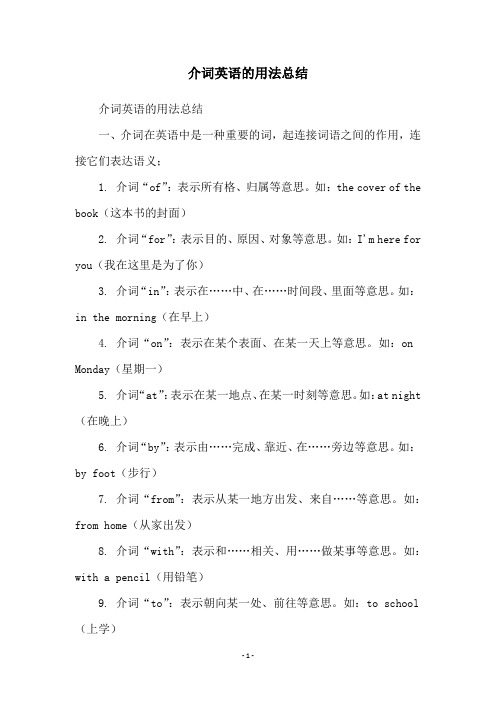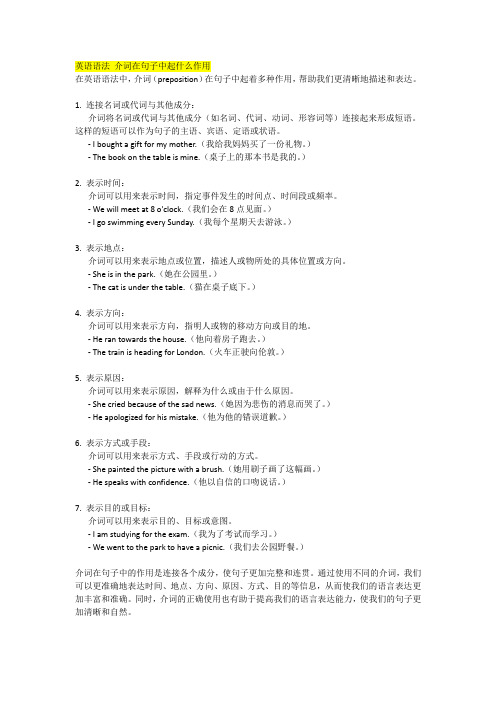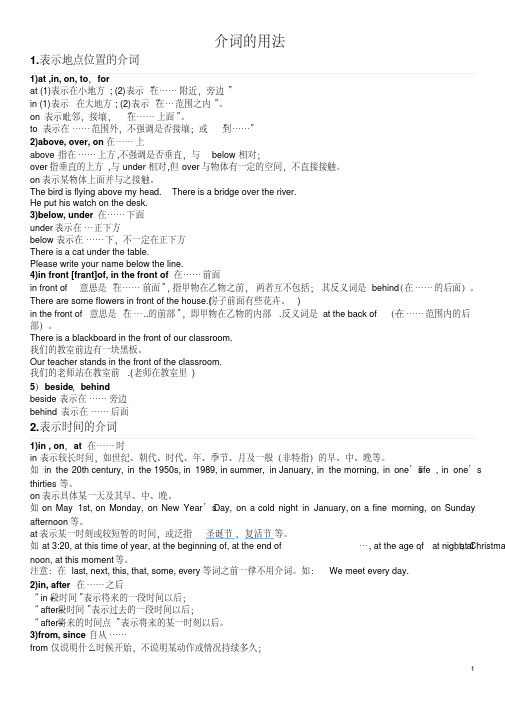英语介词的使用
40个英语介词用法总结

40个英语介词用法总结40个英语介词用法总结1. in: 表示在某个地方或时间内,例如:in the park, in the morning2. on: 表示在某个表面或时间点上,例如:on the table, on Monday3. at: 表示在某个地点或时刻,例如:at the cinema, at 9 o'clock4. by: 表示通过某种方式或在某个时间之前,例如:by car, by tomorrow5. for: 表示为了某个目的或一段时间,例如:for a party, for a week6. with: 表示伴随或使用某物,例如:with friends, with a pen7. to: 表示移动到某个地方或给予某人,例如:go to school, give it to me8. from: 表示起始点或来源,例如:from home, from China9. into: 表示进入某个地点或状态的转变,例如:jump into the water, turn into a butterfly10. out: 表示从某地点离开或移动到室外,例如:go out, look out of the window11. up: 表示向上移动或增加,例如:climb up the stairs,wake up12. down: 表示向下移动或减少,例如:walk down the hill, calm down13. about: 表示关于某事或在某个范围内,例如:talk about the movie, wander about the city14. off: 表示离开或关闭,例如:get off the bus, turnoff the lights15. on: 表示打开或激活,例如:turn on the TV, switch on the computer16. over: 表示越过或在某地上方,例如:jump over the fence, fly over the city17. under: 表示在某物下面或被控制或影响,例如:hide under the bed, live under his rules18. with: 表示具有某种特征或和某人一起做某事,例如:a man with blue eyes, dance with me19. without: 表示没有某物或在缺乏某物的情况下,例如:go without food, live without regret20. by: 表示通过某种方式,例如:learn by doing, go by bus21. through: 表示穿过某物或完成某事,例如:walk through the door, go through the documents22. across: 表示横穿某物或在某个范围内,例如:swimacross the river, all across the world23. between: 表示在两个事物之间或在某个时间段,例如:choose between two options, between 9 and 10 o'clock24. among: 表示在三个或三个以上事物之间或在某群人中,例如:share among friends, discuss among colleagues25. around: 表示在周围或在某个时间点附近,例如:walk around the park, around midnight26. through: 表示通过某事物或在某段时间内,例如:read through the book, work through the night27. against: 表示反对或靠在某物上,例如:fight against injustice, lean against the wall28. for: 表示代表或支持某人或某事,例如:vote for a candidate, fight for freedom29. towards: 表示朝向某个方向或对某人有好感,例如:walk towards the beach, feel towards someone30. within: 表示在某个时间或范围内,例如:arrive within an hour, within the city limits31. beyond: 表示超出某个界限或超过某个程度,例如:beyond expectations, beyond the horizon32. along: 表示沿着某个路线或伴随某人一起,例如:walk along the street, sing along with the song33. above: 表示在某物之上或高于某个程度,例如:flyabove the clouds, above average34. below: 表示在某物之下或低于某个程度,例如:swim below the surface, below freezing35. beside: 表示在某物旁边或和某人一起,例如:sit beside me, beside the lake36. near: 表示在某物附近或接近某个时间,例如:live near the beach, near the end37. past: 表示经过某个地点或在某个时间之后,例如:walk past the store, past midnight38. around: 表示在周围或大约某个数量,例如:look around the room, around 20 people39. after: 表示在某个时间之后或追求某人或某事,例如:after dinner, run after the dog40. before: 表示在某个时间之前或在某个事件之前,例如:before sunrise, before the meeting这些介词是英语中常用的一些基本介词,它们在表达地点、时间、方式等方面起到了重要的作用。
英语介词的用法

⑴时间或地点介词in、on、at的用法区别:表示时间时, in表示在一段时间里(在将来时句子中则表示在一段时间之后), on表示在具体的某一天或者某天的上下午等, at表示在某个时刻或者瞬间;表示地点时, in表示在某个范围之内, on表示在某个平面上或与一个面相接触,at则表示在某个具体的场所或地点。
如:He was born on the morning of May 10th.(他出生于五月十日的早晨)/ I usually get up at 7:00 in the morning.(我通常在早上的七点钟起床) / His glasses are right on his nose.(他的眼镜就架在他的鼻子上)/ He is at the cinema at the moment.(此刻他正在电影院)⑵after与in表示时间的用法区别:“after+(具体时刻/从句)”表示“在…时刻之后”常用于一般时态;“in+(一段时间)”表示“在(多久) 之后”,常用于将来时态。
如:He said that he would be here after 6:00.(他说他六点钟之后会来这儿)/ My father is coming back from England in about a month.(我父亲大约一个月以后从英国回来)⑶since与for表示时间的用法区别:“since+(具体时刻/that-从句)”表示“自从…起一直到现在”,“for +(一段斶间)”表示“总共有…之久”,都常用于完成时态;如:Uncle Li has worked in this factory since 1970.(李叔叔自从1970年起就在这家工厂工作了)/ Uncle Li has worked in this factory for over 30 years. (李叔叔在这家工厂已经工作了30多年)⑷by、in与with表示方式的用法区别:都可以表示“工具、手段”,但是by主要表示“乘坐”某个交通工具或“以……方式”,在被动句中可以表示动作的执行者;in 表示“使用”某种语言/文字,with表示“使用”某个具体的工具、手段。
介词英语的用法总结

介词英语的用法总结介词英语的用法总结一、介词在英语中是一种重要的词,起连接词语之间的作用,连接它们表达语义;1. 介词“of”:表示所有格、归属等意思。
如:the cover of the book(这本书的封面)2. 介词“for”:表示目的、原因、对象等意思。
如:I'm here for you(我在这里是为了你)3. 介词“in”:表示在……中、在……时间段、里面等意思。
如:in the morning(在早上)4. 介词“on”:表示在某个表面、在某一天上等意思。
如:on Monday(星期一)5. 介词“at”:表示在某一地点、在某一时刻等意思。
如:at night (在晚上)6. 介词“by”:表示由……完成、靠近、在……旁边等意思。
如:by foot(步行)7. 介词“from”:表示从某一地方出发、来自……等意思。
如:from home(从家出发)8. 介词“with”:表示和……相关、用……做某事等意思。
如:with a pencil(用铅笔)9. 介词“to”:表示朝向某一处、前往等意思。
如:to school (上学)10.介词“for”:表示为了……、把……作为等意思。
如:for fun (为了好玩)11.介词“as”:表示作为、当……时等意思。
如:as a teacher (作为一个老师)12.介词“over”:表示在……上、穿过等意思。
如:over the bridge (过桥)13.介词“since”:表示从……起、既然等意思。
如:since then (从那时起)14.介词“into”:表示到……里面、转向等意思。
如:into the room(进房间)二、最后,需要强调的是,介词的使用要灵活搭配,以正确表达出英语句子的意思,以便达到更好的英语表达效果。
介词的常见用法及注意事项

介词的常见用法及注意事项介词是连接词与词之间关系的一类词语,常见于英语语法中,它在句子中起到了定位、方向、时间、原因等各种作用。
了解介词的常见用法及注意事项对于掌握英语语法和提高语言表达能力至关重要。
本文将详细介绍介词的常见用法及需要注意的事项。
1. 介词的定义和基本用法介词是一种虚词,通常位于名词或代词前,用于限定名词或代词的关系。
介词也可以位于介词短语的前面。
在句子中,介词通常与名词、代词、动词或副词等其他词语结合,构成介词短语来表达特定的含义。
常见的介词包括:"in"、"on"、"at"、"by"、"with"、"to"、"from"、"over"等。
介词的使用取决于特定的语境和含义。
例如,我们使用"in"表示在某个位置内,"on"表示在某个表面上,"at"表示在某个具体地点等等。
2. 介词的常见用法2.1 表示地点介词常用来表示地点,用于描述人或物所在的位置。
例如:- The book is on the table.(这本书在桌子上。
)- The cat is under the chair.(猫在椅子下面。
)2.2 表示时间介词还常用来表示时间,用于描述事件发生的时间。
例如:- I will meet her at 8 o'clock.(我将在8点钟见她。
)- They usually have dinner on Sundays.(他们通常在星期天吃晚饭。
)2.3 表示方式或原因有些介词可以表示某个动作的方式或原因。
例如:- He broke the vase with a hammer.(他用锤子打碎了花瓶。
)- She cried because of the sad news.(她因为这个悲伤的消息而哭了。
英语介词用法大全

英语介词用法大全★早、午、晚要用in,at黎明、午夜、点与分。
年、月、年月、季节、周,阳光、灯、影、衣、冒in。
将来时态in...以后,小处at大处in。
有形with无形by,语言、单位、材料in。
特征、方面与方式,心情成语惯用in。
介词at和to表方向,攻击、位置、恶、善分。
★日子、日期、年月日,星期加上早、午、晚,收音、农场、值日on,关于、基础、靠、著论。
着、罢、出售、偷、公、假,故意、支付、相反,准。
特定时日和“一……就”,on后常接动名词。
年、月、日加早、午、晚,of之前on代in。
步行、驴、马、玩笑on,cab,carriage则用in。
★at山脚、门口、在当前,速、温、日落、价、核心。
工具、和、同随with,具有、独立、就、原因。
就……来说宾译主,对、有、方状、表细分。
海、陆、空、车、偶、被by,单数、人类know to man。
★this、that、tomorrow,yesterday,next、last、one。
接年、月、季、星期、周,介词省略已习惯。
over、under正上下,above、below则不然,若与数量词连用,混合使用亦无关。
…beyond超出、无、不能,against靠着,对与反。
besides,except分内外,among之内along沿。
同类比较except,加for异类记心间。
★原状because of,、owing to、due to表语形容词under后接修、建中,of、from物、化分。
★before、after表一点, ago、later表一段。
before能接完成时,ago过去极有限。
since以来during间,since时态多变换。
与之相比beside,除了last but one。
复不定for、找、价、原,对、给、段、去、为、作、赞。
快到、对、向towards,工、学、军、城、北、上、南。
but for否定用虚拟,复合介词待后言。
ing型由于鉴,除了除外与包合。
英语语法 介词在句子中起什么作用

英语语法介词在句子中起什么作用在英语语法中,介词(preposition)在句子中起着多种作用,帮助我们更清晰地描述和表达。
1. 连接名词或代词与其他成分:介词将名词或代词与其他成分(如名词、代词、动词、形容词等)连接起来形成短语。
这样的短语可以作为句子的主语、宾语、定语或状语。
- I bought a gift for my mother.(我给我妈妈买了一份礼物。
)- The book on the table is mine.(桌子上的那本书是我的。
)2. 表示时间:介词可以用来表示时间,指定事件发生的时间点、时间段或频率。
- We will meet at 8 o'clock.(我们会在8点见面。
)- I go swimming every Sunday.(我每个星期天去游泳。
)3. 表示地点:介词可以用来表示地点或位置,描述人或物所处的具体位置或方向。
- She is in the park.(她在公园里。
)- The cat is under the table.(猫在桌子底下。
)4. 表示方向:介词可以用来表示方向,指明人或物的移动方向或目的地。
- He ran towards the house.(他向着房子跑去。
)- The train is heading for London.(火车正驶向伦敦。
)5. 表示原因:介词可以用来表示原因,解释为什么或由于什么原因。
- She cried because of the sad news.(她因为悲伤的消息而哭了。
)- He apologized for his mistake.(他为他的错误道歉。
)6. 表示方式或手段:介词可以用来表示方式、手段或行动的方式。
- She painted the picture with a brush.(她用刷子画了这幅画。
)- He speaks with confidence.(他以自信的口吻说话。
英语介词的用法总结(完整版)

介词的用法1.表示地点位置的介词1)at ,in, on, to,forat (1)表示在小地方; (2)表示“在……附近,旁边”in (1)表示在大地方; (2)表示“在…范围之内”。
on 表示毗邻,接壤,“在……上面”。
to 表示在……范围外,不强调是否接壤;或“到……”2)above, over, on 在……上above 指在……上方,不强调是否垂直,与below相对;over指垂直的上方,与under相对,但over与物体有一定的空间,不直接接触。
on表示某物体上面并与之接触。
The bird is flying above my head. There is a bridge over the river.He put his watch on the desk.3)below, under 在……下面under表示在…正下方below表示在……下,不一定在正下方There is a cat under the table.Please write your name below the line.4)in front [frant]of, in the front of在……前面意思是“在……前面”,指甲物在乙物之前,两者互不包括;其反义词是behind(在……的后面)。
in front of…There are some flowers in front of the house.(房子前面有些花卉。
)in the front of 意思是“在…..的前部”,即甲物在乙物的内部.反义词是at the back of…(在……范围内的后部)。
There is a blackboard in the front of our classroom.我们的教室前边有一块黑板。
Our teacher stands in the front of the classroom.我们的老师站在教室前.(老师在教室里)5)beside,behindbeside 表示在……旁边behind 表示在……后面2.表示时间的介词1)in , on,at 在……时in表示较长时间,如世纪、朝代、时代、年、季节、月及一般(非特指)的早、中、晚等。
介词用法详解

介词用法详解介词在英语中起着连接句子成分、表示位置、时间、方式等作用。
正确的使用介词对于掌握英语语法和提高英语表达能力非常重要。
本文将详细解析英语常见的介词用法。
一、在时间表示中的用法1. 表示具体时间点:at- I will meet you at 8 o'clock.- I have an appointment at noon.2. 表示时间段:in- We usually go on vacation in summer.- She finished the report in two hours.3. 表示一段时间之前或之后:before / after- I will call you before dinner.- He arrived after the meeting started.二、在地点表示中的用法1. 表示具体地点:at / in / on- She is waiting for you at the bus stop.- The library is in the city center.- The children are playing on the playground.2. 表示方向:to / towards- I walked to the park.- They ran towards the exit.三、在方式表示中的用法1. 表示方式和手段:by- We traveled to Beijing by train.- He sent the document by email.2. 表示交通工具:on / by- I go to work on foot.- She goes to school by bus.四、在原因和目的表示中的用法1. 表示原因:because of- The game was canceled because of the bad weather. - He couldn't attend the party because of his illness.2. 表示目的:for- I bought a gift for my friend's birthday.- We studied hard for the upcoming exam.五、在其他表示中的用法1. 表示关系:of- The book on the table is mine.- The color of the car is blue.2. 表示所属关系:of- The top of the mountain was covered in snow.- The tail of the dog was wagging happily.总结:介词在英语中有着不同的用法,包括时间、地点、方式、原因和目的等方面。
- 1、下载文档前请自行甄别文档内容的完整性,平台不提供额外的编辑、内容补充、找答案等附加服务。
- 2、"仅部分预览"的文档,不可在线预览部分如存在完整性等问题,可反馈申请退款(可完整预览的文档不适用该条件!)。
- 3、如文档侵犯您的权益,请联系客服反馈,我们会尽快为您处理(人工客服工作时间:9:00-18:30)。
介词in, on与at表时间的用法
at < 天 (eg. noon, dawn, night, one’ clock)
on = 天 (Monday, 30th June, New Year’s Day, Mother’s Day)
in > 天(2008, summer, April, 还有早午晚)
用in的场合后所接的都是较长时间
(1)表示“在某世纪/某年代/特定世纪某年代/年/季节/月”这个含义时,须用介词in Eg: This machine was invented in the eighteenth century. 这台机器是在18世纪发明的。
This incident happened in the 1970s. 该事件发生在20世纪70年代。
She came to this city in 1980. 他于1980年来到这个城市。
It often rains here in summer. 夏天这里常常下雨。
(2)表示“从现在起一段时间以后”时,须用介词in。
(in+段时间表将来) Eg: They will go to see you in a week. 他们将在一周后去看望你。
I will be back in a month. 我将在一个月后回来。
(3)泛指一般意义的上、下午、晚上用in, in the morning / evening / afternoon Eg: They sometimes play games in the afternoon. 他们有时在下午做游戏。
Don't watch TV too much in the evening. 晚上看电视不要太多。
(4)A. 当morning, evening, afternoon被of短语修饰,习惯上应用on, 而不用in.
Eg: on the afternoon of August 1st
(5)B. 但若前面的修饰词是 early, late时,虽有of短语修饰,习惯上应用in, 而不用on.
Eg: in the early morning of September 10th 在9月10的清晨;
in the late afternoon of September 12th 在9月12日的傍晚。
Early in the morning of National Day, I got up to catch the first bus to the zoo. 国庆节一清早,我便起床去赶到动物园的第一班公共汽车。
用on的场合后所接的时间多与日期有关
(1)表示“在具体的某一天”或(在具体的某一天的)早上、中午、晚上”,或“在某一天或某一天的上午,下午,晚上”等,须用介词on。
Eg: Jack was born on May 10th, 1982. 杰克生于1982年5月10日。
They left on a rainy morning. 他们是在一个雨天的早上离开的。
He went back to America on a summer afternoon. 他于一个夏天的下午返回了美国。
(2)表示“在星期几”或“在星期几的早上、中午、晚上”等,须用介词on。
Eg: We don't go to school on Saturday and Sunday. 我们星期六和星期天不上学。
What time do you get up on weekdays? 你在平日什么时候起床?
I heard this story on Saturday morning. 我是在星期六的早晨听到这个故事的。
【温馨提示】“在周末”: at weekends, on weekends. “在工作日”是 on weekdays
on the weekend, at the weekend加了定冠词the, 是特指的那个周末,表示某个固定的周末;
on weekends, at weekends是一般性的每个周末。
美国英语习惯使用 on: on weekends 把周末看作星期同类,因为无论星期几都用on, 这样是对的;
英国英语习惯用at: at weekends 把周末看作节假日,自然也是对的。
(3)表示“在某一节假日、生日”时,须用介词on。
Eg: on my birthday Mr Hu received a card on Teachers' Day. 胡老师在教师节那天收到了一张卡片。
We usually eat mooncakes on Mid-autumn Festival. 我们通常在中秋节吃月饼。
【温馨提示】 at, on都可用来表示“节假日”,但at侧重指“休假的时节”,而不是指具体的哪一天;on侧重指具体的时日,与它连用的短语中多含“Day”
at New Year(在新年期间)
at Christmas (在圣诞节期间)
on New Year’s Day(在元旦那天)
on Christmas Day (在圣诞节)
用at的场合后接的时间最短
(1)表示“某一具体时刻(即几点几分时)”时,用于钟点时刻前,须用介词at。
Eg: at ten o’clock, at a quarter to six
He gets up at six o'clock every day. 他每天六点起床。
I got home at five thirty yesterday afternoon. 我昨天下午五点半到家。
(2)用在特定的时候(时节、时机)时,须用介词at, 表示一瞬间或短暂的时间
Eg: They were happy at that time. 他们那时很幸福。
I think the shop is clcsed at this time of day. 我认为商店在白天的这个时候关门了。
at that moment(在那一瞬间)
at that time(那时)
(3)用于表示进餐时间。
Eg: at breakfast/lunch/supper (在早餐时/午餐时/晚餐时)
He drinks tea at breakfast. 他在早餐时饮茶。
(4)表示“在……岁”时,须用介词at。
Eg: At the age of nine ,the boy could swim well.在九岁的时候,这孩子就游泳游得很好了。
(5)表示“在中午、在夜晚、在周末”时,须用介词at。
Eg: at noon /night /midnight (半夜), at sunrise (日出时)
at dusk (黄昏), at dawn /daybreak (黎明)
What do you often do at noon? 你中午经常做些什么?
You can see many stars in the sky at night. 夜晚你能看到天空中有许多星星。
省略介词的情况
1.next, last, this, that与时间名词连用作状语时,该短语前常省略介词。
Eg: We’re going to work on a farm next Sunday. 下个星期天,我们要去农场劳动。
They visited the Great Wall last year. 去年他们参观了长城。
2.在today, tomorrow, yesterday, the day before yesterday, the day after tomorrow, tomorrow night 等之前不用任何介词。
Eg: Are you free tomorrow night? 明晚你有空吗?
Where did you go the day before yesterday? 前天你去哪儿了?
注意:在含有next, last, this, one, any, each, every, some, all等修饰时和tomorrow, yesterday, the day after tomorrow, the day before yesterday 前不用任何介词。
Eg: What did you do last summer holidays? 去年暑假你做了些什么?
What are you going to do the day after tomorrow? 后天你打算做什么?。
